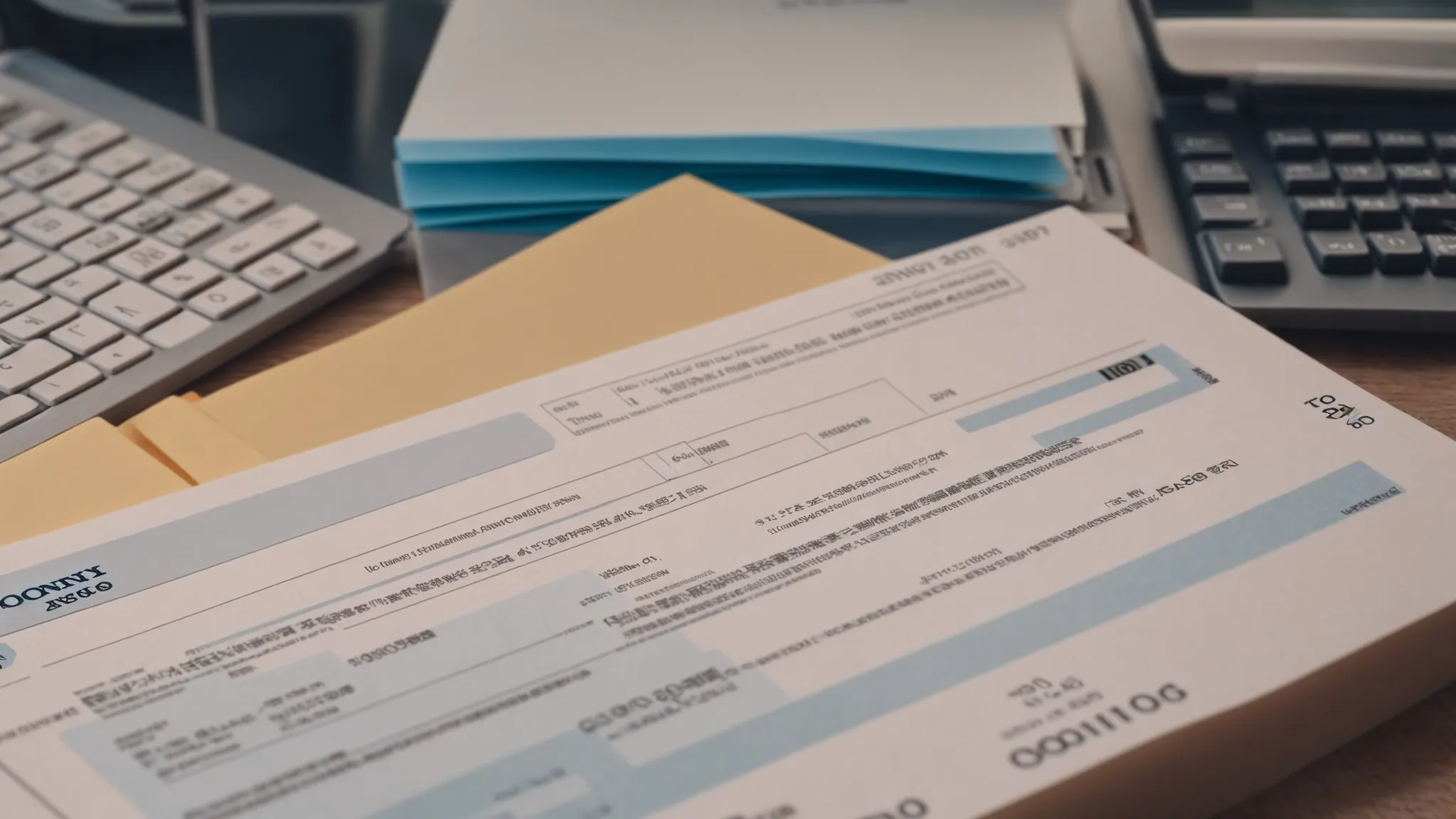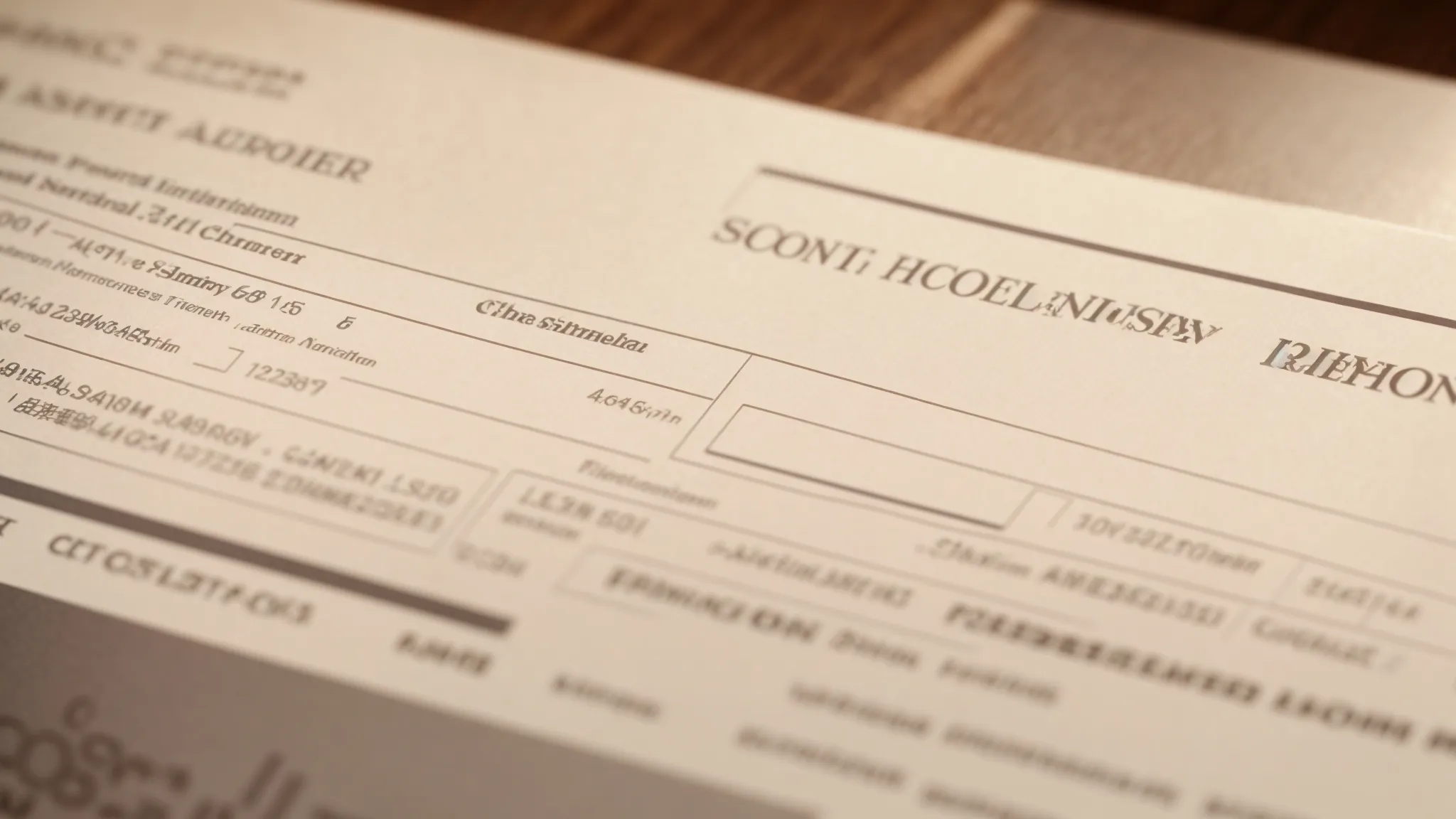Ordering cheques online seems straightforward, but many businesses overlook critical details that can lead to costly errors. Common mistakes include inadequate proofreading, misunderstanding payment methods, and neglecting delivery options. This blog post will highlight the top 10 mistakes to avoid when ordering cheques online for your business. By addressing these issues, companies can minimize the risk of cheque fraud and ensure efficient transactions that satisfy their finance teams. Let this guide help you streamline your cheque ordering process and protect your credit history while enhancing cash flow management.
Understanding Online Cheque Ordering

Accurate information is essential when ordering cheques online, as it directly impacts financial operations, including accounts receivable management. Understanding the different cheque types, such as manual and laser cheques, is key for effective bookkeeping. This section will provide insights on avoiding common errors that can lead to issues, ensuring a smooth ordering experience.
Importance of Accurate Information
Accurate information is vital when ordering cheques online, as any mistakes can disrupt financial operations, including revenue management. A business using accounting software relies on precision to ensure cheques are compatible, avoiding potential delays or errors during processing. Businesses should provide clear instructions to prevent issues that could arise from incorrect cheque types, especially when integrating with systems like Zelle or preparing certified checks.
Furthermore, understanding cheque features helps prevent inventory mistakes that might occur due to misordered cheque styles or formats. It’s essential to review details thoroughly before finalizing an order. In doing so, organizations can ensure that their cheques meet their specific needs, ultimately leading to smoother transactions and maintaining positive relationships with vendors and banks.
Knowing Your Cheque Types
Understanding the various cheque types is crucial for businesses to avoid ordering mistakes. Manual cheques serve well for smaller transactions or those who prefer physical payments, while laser cheques are ideal for businesses that require bulk printing. The use of magnetic ink character recognition (MICR) on cheques is essential as it helps in preventing fraud, ensuring that the details are securely processed by banks and credit unions alike. Selecting the wrong type can lead to complications, such as delays or acceptance issues, which can ultimately affect cash flow.
Moreover, businesses must also consider the security features of their chosen cheque style to protect against theft and unauthorized access. Selecting cheques with advanced protective measures can significantly reduce the risk of fraud and safeguard company credit. By knowing these cheque types, business owners can make informed decisions that align with their financial operations, ultimately maintaining trust with their clients and partners.
Ordering cheques online can save time, but pitfalls await the careless. Recognizing common mistakes can mean the difference between a smooth order and a frustrating setback.
Common Mistakes When Placing Orders

Many businesses encounter common pitfalls when ordering cheques online, which can have significant implications for their accounting processes. Failing to verify vendor authenticity may lead to issues with debits and credits, while ignoring design verification can complicate transaction processing. Additionally, overlooking security features and choosing incorrect quantities can create problems with clearing payments and incurring unnecessary fees. Addressing these areas ensures a smoother payment system and safeguards financial operations.
Failing to Verify Vendor Authenticity
Businesses often overlook the importance of verifying vendor authenticity when ordering cheques online. Conducting thorough research on suppliers can prevent complications related to direct debits and potential fraud. For instance, businesses in India should ensure their cheque providers comply with regulations set by the Reserve Bank of India to guarantee reliability and security in procurement processes.
Additionally, confirming the legitimacy of cheque vendors helps protect against counterfeit cheques, which can harm a company’s finances and reputation. Many organizations are shifting toward digital cards and electronic payments, but traditional cheque usage remains vital for various transactions. Ensuring a reputable source for cheque orders is essential for maintaining smooth financial operations and safeguarding company assets.
Ignoring Design Verification
Ignoring design verification can lead to significant complications for businesses during the cheque ordering process. Failure to ensure that cheque designs meet the latest security standards can expose companies to crime, making them vulnerable to fraud. By not verifying that the accepted layouts work seamlessly with accounts payable processes, businesses risk delays and increased costs associated with incorrect or unapproved cheque formats.
Moreover, overlooking this crucial step may also result in conflicts with federal trade commission regulations regarding cheque authenticity and security features. Businesses should consider involving experts in automation processes to streamline cheque design validation. This proactive approach helps safeguard against counterfeit cheques, ensuring compliance with customs while protecting the financial integrity of the organization.
Overlooking Security Features
Overlooking security features when ordering cheques online can expose businesses to significant risks. Many consumers are unaware that cheques without robust security measures are susceptible to fraud, which can lead to unauthorized transactions draining a savings account. Incorporating advanced features in cheque design, such as watermarks or microprinting, serves as a critical safeguard against counterfeiting and ensures the integrity of every invoice processed.
Furthermore, businesses that neglect this aspect may face complications when utilizing automated teller machines or handling direct deposit transactions. Ensuring that cheques meet the latest security standards not only protects against potential theft but also enhances the trustworthiness of the business in the eyes of vendors and customers alike. Prioritizing security during the ordering process ultimately fosters a more secure financial environment, safeguarding both business assets and client relationships.
Choosing Incorrect Quantities
Choosing incorrect quantities of cheques can significantly impact a business’s corporate finance strategies. For instance, ordering too few cheques can result in unforeseen delays when managing debts or making payments, ultimately disrupting cash flow. On the other hand, ordering an excessive number may lead to wasted resources and additional storage costs, creating unnecessary strain on operational budgets.
Small to medium-sized business owners should consider their cheque usage frequency and anticipated needs to avoid these pitfalls. For example, some businesses may benefit from balancing cheque orders with other payment methods, such as debt management through wire transfers, debit cards, or digital wallets. This approach ensures that a company maintains an efficient payment process while minimizing the risks associated with overcommitting to cheque orders.
Mistakes in order placement can lead to costly delays and frustration. Next, consider how inadequate proofreading can quietly undermine your efforts and lead to errors in your final product.
Inadequate Proofreading Before Ordering

Inadequate proofreading can lead to mistakes in personal and business details, along with errors in amounts and dates on cheques. These inaccuracies can create barriers when managing finances, including challenges in tracking income statements and reconciling checking accounts. By focusing on these areas, businesses can ensure their cheques are accurate, ultimately facilitating smoother transactions for payments, whether by wire or mobile payment methods.
Mistakes in Personal and Business Details
Mistakes in personal and business details during the cheque ordering process can lead to significant repercussions. Incorrect information like the ABA routing transit number may result in halted payments, complicating relations with vendors and affecting the overall balance sheet. Businesses must ensure that every aspect of their details is carefully verified to prevent issues related to automated clearing house transactions, thereby maintaining smooth financial operations.
Furthermore, inaccuracies can also expose businesses to the risk of counterfeit cheques. A small error in the name or address can lead to fraudulent activity, putting financial assets at risk. Therefore, businesses should conduct thorough proofreading of personal and business details before finalizing any cheque order, ensuring that all information aligns with official records to safeguard against potential losses and maintain credibility with financial institutions.
Errors in Amounts and Dates
Errors in amounts and dates on cheques can create significant issues for businesses, leading to complications in accounting and financial management. A simple mistake, such as entering the wrong amount, can cause delays in payments, resulting in bad debt and strained vendor relationships. Additionally, incorrect dates can render a document invalid, affecting operations and cash flow. Ensuring that every cheque reflects accurate information is crucial to maintaining smooth transactions and fostering trust with partners.
Moreover, these errors can expose businesses to identity theft, especially if critical information is incorrectly displayed on a cheque. Mistakes can allow unauthorized transactions that drain funds, impacting overall financial health. Businesses should prioritize thorough proofreading before finalizing any online cheque order, ensuring that all details align with their accounting records, thus safeguarding against potential risks related to online banking and fraud.
Errors in the details can cost a business dearly. Yet, overlooking delivery options can lead to delays that are just as damaging.
Not Considering Delivery Options

Underestimating shipping times can lead to delays in cheque availability, impacting a business’s financial operations. Businesses should also consider the importance of tracking services to monitor their orders effectively. Evaluating these delivery options ensures that businesses avoid complications related to their deposit accounts, safeguarding against issues like credit card fraud and maintaining smooth transactions for important payments.
Underestimating Shipping Times
Underestimating shipping times poses a significant risk for businesses that rely on timely cheque availability. Delays in receiving cheques can disrupt payment schedules, causing headaches when it comes to processing paychecks or managing essential expenses. To mitigate this risk, businesses should always factor in potential shipping delays, especially during peak seasons or unforeseen events that could impact delivery timelines.
Moreover, businesses must be vigilant about monitoring shipping progress to avoid complications related to phishing attempts targeting company payment cards. Ensuring that cheques arrive on time protects against unauthorized transactions and maintains a reliable cash flow. By prioritizing delivery options and accurately estimating shipping times, businesses can safeguard their financial operations and uphold trust with vendors and partners.
Ignoring Tracking Services
Ignoring tracking services when ordering cheques can create significant complications for businesses, especially when managing sensitive elements of personal finance. Without the ability to monitor cheque shipment, vendors may face delays that disrupt payment schedules, leading to potential cash flow issues. Timely access to cheques is crucial for maintaining smooth transactions and strong relationships with banks, particularly if any discrepancies arise that require immediate resolution with a bank teller.
Additionally, neglecting to utilize tracking services can increase the risk of cheque fraud, such as check kiting. In the event of missing cheques, businesses may struggle to implement necessary security measures, including positive pay features offered by banks to prevent unauthorized transactions. By prioritizing tracking options during the ordering process, organizations can safeguard their financial assets and enhance overall operational efficiency.
Delivery options came and went, overlooked like a misplaced tool. In the shadow of those choices, many found themselves confused by the details of payment methods that followed.
Misunderstanding Payment Methods

Choosing insecure payment options can expose businesses to scams that jeopardize their financial stability. Understanding the fees associated with different payment methods is equally critical, as unexpected charges can strain a budget. This section highlights the implications of selecting unreliable payment methods, alongside insights into managing bank accounts and contracts effectively to avoid pitfalls when ordering cheques online.
Choosing Insecure Payment Options
Businesses often encounter risks when opting for insecure payment options while ordering cheques online. Using unverified payment methods can compromise cash flow and expose organizations to financial fraud. Take, for instance, when a company provides its email address for digital payments without confirming the security measures in place. Such lapses can lead to costly losses as unauthorized transactions emerge, significantly impacting the operations of a business.
Furthermore, selecting the wrong payment method can complicate relationships with financial institutions, particularly if discrepancies arise during cheque processing. Ensuring the spelling of account names and numbers is accurate is essential to prevent misunderstandings. If a cashier receives a cheque with incorrect details, it can delay transactions and further strain cash flow. Businesses should prioritize secure payment options to ensure consistent financial management and maintain trust with their banking partners.
Not Understanding Fees Associated
Understanding the fees associated with ordering cheques online is crucial for businesses managing their transaction accounts effectively. Many organizations fail to account for service charges that may arise from various payment methods, including direct debits that could result in an overdraft. By clarifying these fees ahead of time, businesses can avoid unexpected financial strain that affects overall budgeting and cash flow management.
Moreover, businesses using mobile banking or a mobile app to process cheque orders should be aware of potential hidden costs linked to these platforms. Some digital banking services may charge additional fees for electronic cheque processing or limit transaction amounts, complicating how a company manages its finances. Thoroughly evaluating the fees tied to payment methods ensures that businesses remain in control of their expenditures while maintaining efficient cheque processing communications.
Understanding payment methods is only part of the job. Keeping track of those transactions can save businesses from bigger troubles down the line.
Neglecting Record Keeping

Neglecting record keeping during the cheque ordering process can lead to significant challenges for businesses. Failing to track orders may result in confusion regarding delivery timelines and the status of purchases. Documenting transactions is crucial for maintaining accurate financial records, ensuring that all cheque orders are accounted for, and facilitating smoother reconciliation efforts.
Additionally, effective record keeping serves as a safeguard against discrepancies and unauthorized transactions. By highlighting the importance of tracking orders and documenting details, businesses can enhance their financial management and minimize the risk of errors that could impact their operations.
Failing to Track Orders
Failing to track orders when purchasing cheques online can lead to confusion and unforeseen delays, which might disrupt a business’s cash flow. When companies do not monitor their cheque shipments, they risk encountering issues such as late invoices or missed payment deadlines. This lack of oversight can ultimately harm vendor relationships, impacting overall financial health.
Moreover, keeping accurate records of cheque orders is crucial for effective financial management. Businesses that neglect this practice may struggle to reconcile banking statements, leading to discrepancies that can complicate cash flow analysis. By implementing a systematic approach to order tracking, organizations can gain better visibility into their expenditures and maintain a smoother operational process.
Importance of Documenting Transactions
Documenting transactions is essential for maintaining accurate financial records when ordering cheques online. It ensures that every cheque order is tracked, providing a clear history of expenditures and enabling businesses to reconcile their accounts more efficiently. For instance, by keeping meticulous records, companies can easily address discrepancies that may arise during banking statement reconciliations, leading to smoother financial operations.
Inadequate documentation can lead to confusion regarding order statuses, shipment tracking, and payment schedules. Businesses that fail to document their cheque orders may struggle with late payments or missed deadlines, ultimately damaging vendor relationships. By prioritizing transaction documentation, organizations not only enhance their financial management but also build trust with suppliers and banks, safeguarding their overall financial health.

